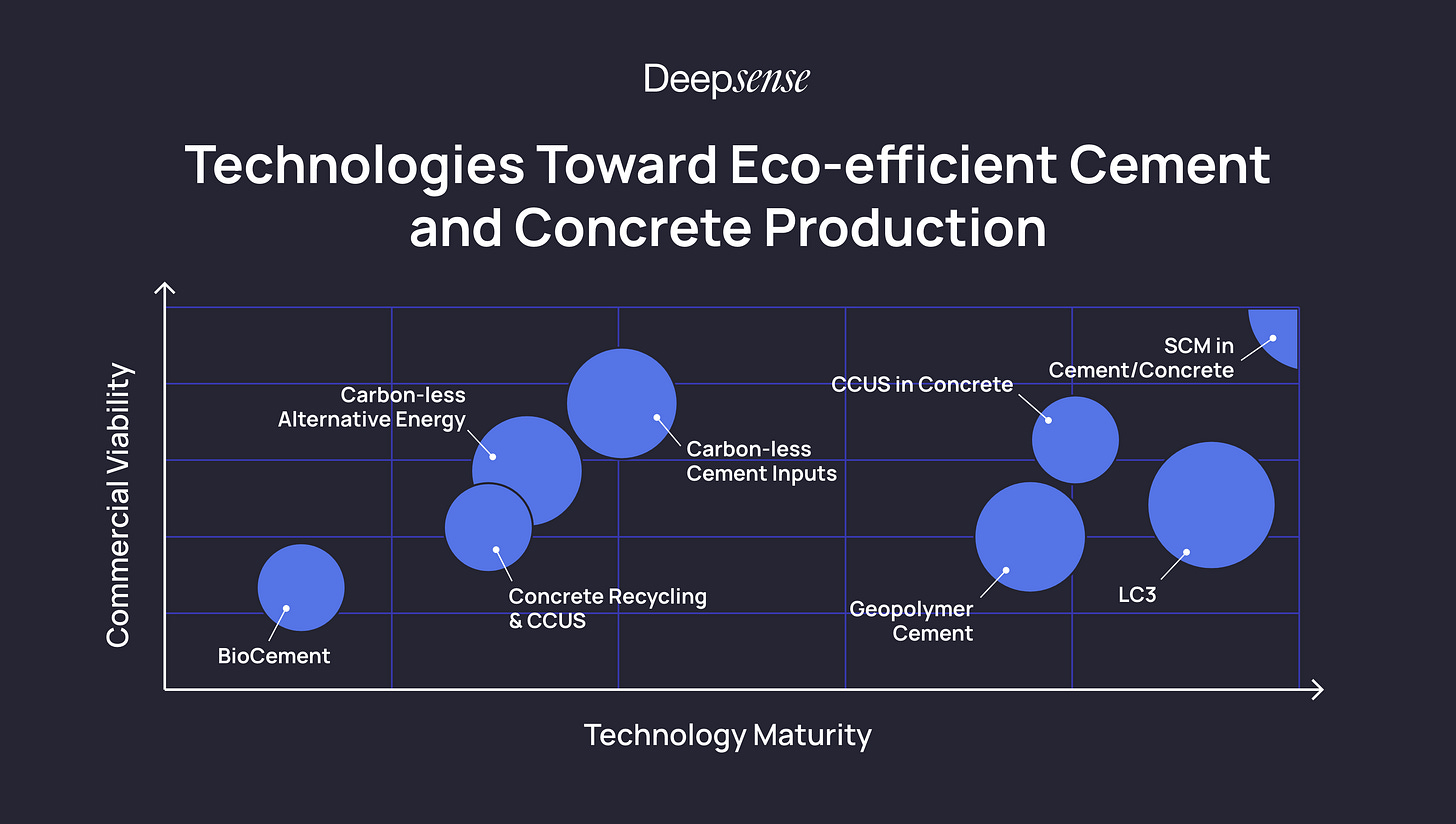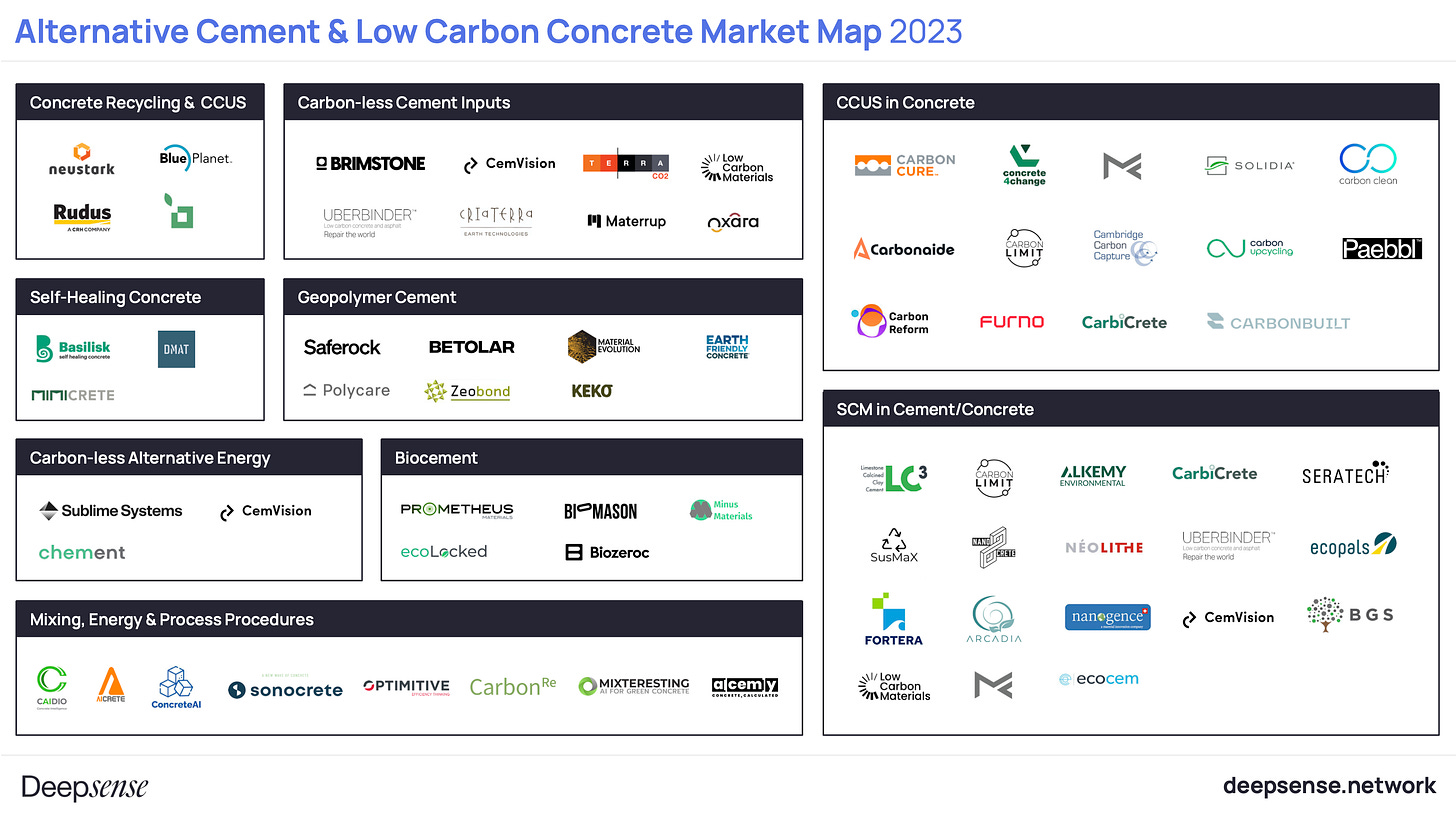Cement’s multi-billion-dollar industry opportunity
Exploring Opportunities in Alternative Cement & Low Carbon Concrete
Hi, Deepsense community! Welcome to the second issue of Deepsense Insights, the newsletter that brings you the latest on science and technology investment opportunities.
In this issue, we shift our focus to the world of alternative cement and low-carbon concrete, showcasing the remarkable advancements that are shaping the future of the industry. Let's dive in! 🥽
🌍 Cement and Concrete Production: A Global Challenge
Cement and concrete are essential materials extensively consumed worldwide, second only to water. The demand for these materials continues to rise due to urbanization, infrastructure development, and population growth. Unfortunately, their production has significant environmental implications. The manufacturing process, especially in ordinary Portland cement (OPC) production, emits a substantial amount of carbon dioxide (CO2), contributing to 8-10% of global anthropogenic CO2 emissions. Moreover, the depletion of finite resources like limestone and clay raises concerns about the industry's sustainability.
💡 Proven But Threatened?
Currently, partially replacing cement with supplementary cementitious materials (SCMs) such as blast furnace slag and coal fly ash has proven effective in reducing cement usage. However, upcoming changes in the metallurgy industry, aimed at reducing carbon emissions, could limit the future availability of blast furnace slag as an SCM. Similarly, the closure of coal-fired power plants in various countries poses a threat to the availability and accessibility of coal fly ash as an SCM.
Given these potential challenges, it is crucial for researchers, regulators, and stakeholders to explore alternative solutions and sustainable sources for SCMs to ensure the continued reduction of cement usage.
🌱 Sustainable Approaches to Concrete
In the pursuit of sustainability in cement and concrete production, several innovative approaches have emerged as viable alternatives to traditional methods. These solutions aim to minimize the carbon and ecological footprints associated with the industry by reducing the amount of natural raw materials used in cement making and by using alternative cementitious materials, industrial residues and CO2 sequestration into structural materials. Other solutions include the use of alternative fuel/energy during clinkering (think Cemex and Sublime Systems) and carbon-less raw materials for cement production using sustainable and efficient technologies.
One such approach is Limestone Calcined Clay Cement (LC3), developed by researchers at École Polytechnique Fédérale de Lausanne (EPFL). LC3 replaces 50% of cement clinker with a ternary Supplementary Cementitious Material (SCM), resulting in significant CO2 emission reductions. Industrial trials conducted in Cuba and India have successfully demonstrated the potential of this approach.
Companies like CarbonCure have adopted carbon-capturing techniques to embed captured CO2 back into concrete, making their production process carbon-negative. This method not only enhances the mechanical and durability properties of precast concretes but also surpasses conventional curing methods. Carbonaide and Solidia are also leveraging carbon capture and utilization techniques in their concrete production. Solidia has estimated that their two main technologies can eliminate at least 1.5 gigatons of CO2 annually.
Brimstone and Terra CO2 have taken a different route by utilizing alternative raw materials instead of limestone during the clinkering process. They employ carbon-free silicate-based rocks, which help reduce carbon emissions throughout production. These technologies offer a sustainable solution with access to abundant resources like silicate-based materials or silicate rocks.
In the realm of bio-based solutions, companies like Prometheus and Biomason are pioneering bio-cement and bio-concrete production. These innovative approaches use bio-methods and natural microorganisms to create zero-carbon alternatives, contributing to a greener future. Inspired by biology, Biomason is using a multi-patented novel technology to fusing carbon and calcium with natural microorganisms to produce bio-cement.
Geopolymer cement, another promising option, is being developed by companies such as Zeobond, Keko Geopolymerit, Betolar, and Wagner. These companies utilize industrial residues and alkali hydroxides to create geopolymer cement, which boasts significantly lower carbon emissions and enhanced fire resistance.
Additionally, concrete recycling has gained traction as a sustainable pathway. Companies like Neustark and Rudus are at the forefront of concrete waste recycling. Neustark captures atmospheric CO2 and permanently stores it through mineralization in demolished concrete aggregates, transforming them into carbon sinks that can be reused in construction.
🚀 Collaborative Action for a Sustainable Future
While each of these technologies shows immense promise, the transition to a more sustainable cement and concrete industry requires collaborative action. Governments, through certification programs, tax credits, regulations, and emission offset initiatives, can foster an environment conducive to widespread adoption. Likewise, private investments and innovative carbon reductions credits play a pivotal role in driving scalability.
⛹️ Players in Alternative Cement & Low Carbon Concrete
Solidia Technologies 🇺🇸
Develops a lower-CO2 cement-making process and embeds CO2 in concrete curing.
Founded: 2007
Disclosed Amount raised to date: $265MM
Disclosed Last round: Later Stage VC, April 2021
Disclosed Investors: Air Liquide Venture Capital, Aster Capital, BASF Venture Capital, BP Ventures, Breakthrough Energy Ventures, Bright-Capital, CPP Investments, Incite Ventures, Imperative Ventures, Kleiner Perkins, Lafarge, OGCI Climate Investments, Piva Capital, Prelude Ventures, TotalEnergies Ventures, Zero Carbon Partners and several Business Angel (including John Doerr and William Joy)
Terra CO2 Technology 🇺🇸
Aims to replace Portland cement with "cementitious materials" produced from silicate-type feedstocks that are more abundantly available and that can be sourced closer to the point of production — granite, sedimentary rocks including glacier and tidal deposits, basalt and mining waste streams.
Founded: 2016
Disclosed Amount raised to date: $100MM
Disclosed Last round: Series A, July 2022
Disclosed Investors: Breakthrough Energy Ventures, Creative Ventures, LIP Ventures Boutique, Lennar Ventures, Rio Tinto, Strategic Metals
BioMason 🇺🇸
Develops a cement mix based on naturally occuring phenomena.
Founded: 2012
Disclosed Amount raised to date: $95MM
Disclosed Last round: Series C, February 2022
Disclosed Investors: 2150, Acorn Innovestments, Celesta Capital, Hartree Partners, Martin Marietta, Noel Ventures, Novo Holdings, National Science Foundation,
Brimstone 🇺🇸
Develops a breakthrough carbon-negative process to produce the same ordinary portland cement and supplementary cementitious materials used today.
Founded: 2019
Disclosed Amount raised to date: $55MM
Disclosed Last round: Series A, March 2022
Disclosed Investors: Accelr8, Amazon, Breakthrough Energy Ventures, Collaborative Fund, Creative Destruction Lab (CDL), DCVC, Fifth Wall, Gatemore Capital, Impact Science Ventures, Osage University Partners, Plug and Play, S2G Ventures, Systemiq Capital, The Climate Pledge
Sublime Systems 🇺🇸
Replaces the industry's legacy fossil-fuel-intensive thermal calciner process with an electrochemical process that produces low-carbon cement at ambient temperatures with renewable electricity.
Founded: 2020
Disclosed Amount raised to date: $40MM
Disclosed Last round: Series A, January 2023
Disclosed Investors: E14 Fund, Energy Impact Partners, Lowercarbon Capital, MCJ Collective, Prime Impact Fund, Siam Cement Public Company, The Engine
Crabicrete 🇨🇦
Uses waste slag from the steel industry to completely eliminate the need for cement in the concrete production process.
Founded: 2016
Disclosed Amount raised to date: $28MM
Disclosed Last round: Series A, April 2022
Disclosed Investors: Aera VC, ARC Financial, Fondaction, Fonds de solidarité FTQ, FS Investors, Harsco, Innovobot, MacKinnon, Bennett & Company, New Climate Ventures, NGen, Praxair, Saint-Gobain NOVA, Something Good Ventures, Sustainable Development Technology Canada
Ecocem 🇮🇪
Develops low-carbon cementitious products using slag from steel furnaces in a state-of-the-art process that entails less carbon production than traditional production methods.
Founded: 2003
Amount raised to date: $24MM
Last round: Later Stage VC, May 2021
Investors: Breakthrough Energy Ventures
CarbonCure 🇨🇦
Develops a retrofit innovation that repurposes CO2 gas from large final emitters as a feedstock in concrete plants.
Founded: 2020
Amount raised to date: $12MM
Last round: Series E, February 2021
Investors: 2150, Amazon, BDC Capital, Breakthrough Energy Ventures, BrightPath Capital Partners, Carbon Direct Capital Management, Carmanah, Elemental Excelerator, GreenSoil Investments, Invest Nova Scotia, Microsoft, Mitsubishi, Pangaea Ventures, Power Generations, Stripe, Sustainable Development Technology Canada, Taronga Ventures, The Climate Pledge, The Shaw Group, Thistledown Foundation and several Angel Investors (including Jeff Bezos, Marc Benioff, Reid Hoffman and Yun Ma)
CarbonBuilt 🇺🇸
Develops a concrete mixture that requires less cement, and a curing process that embeds CO2 captured from industrial streams but could also come from direct air capture.
Founded: 2020
Amount raised to date: $10MM
Last round: Series A, October 2021
Investors: Climate Capital, Foundamental, Grantham Foundation, Lime Street Ventures, Morgan Stanley, Pritzker Group Venture Capital, UCLA Ventures and several Angel Investors
Paebbl 🇸🇪
Develops a technology for carbon dioxide mineralization, enabling clients to use carbon-negative raw materials, for example allowing them to replace part of the concrete mix with this material.
Founded: 2021
Amount raised to date: $9MM
Last round: (Pre-)Seed, October 2022
Investors: 2050, First Fellow Partners, Pale blue dot, The Grantham Foundation, Voyagers.io, Walerud Ventures, Wave Ventures
Prometheus Materials 🇺🇸
Uses microalgae to produce a bio-cement that offers an alternative to carbon-intensive portland cement.
Founded: 2021
Amount raised to date: $8MM
Last round: Series A, March 2022
Investors: Autodesk Foundation, GAF, ImpactAssets, Microsoft Climate Fund, Skidmore Owings & Merrill, Sofinnova Partners
Saferock 🇳🇴
Develops new geopolymer concrete based on upcycling mining and industry waste materials.
Founded: 2019
Amount raised to date: $3.8MM
Last round: Series A, August 2022
Investors: Awilco, Equinor Ventures, GC Rieber, Validé
Material Evolution 🇬🇧
Uses a patented geopolymer technology and proprietary algorithms to create more sustainable materials.
Founded: 2017
Amount raised to date: $3.4MM
Last round: Seed, November 2021
Investors: Applebridge, At One Ventures, HG Ventures, Innovate UK, Kompas VC, Playfair Capital, SkyRiver Ventures, The Heritage Group, Techstars
Carbonaide 🇫🇮
Provides technology to utilize and store carbon dioxide in the precast concrete industry.
Founded: 2016
Amount raised to date: $2MM
Last round: Seed, March 2023
Investors: Lakan Betoni, Vantaa Energy
ecoLocked 🇩🇪
Produces carbon-negative building materials by incorporating biochar into concrete.
Founded: 2021
Amount raised to date: $2MM
Last round: Pre-Seed, September 2022
Investors: Better Ventures, Counteract Partners, SF Berlin, Plug and Play, Startup Family Office, Voyagers.io
Minus Materials 🇺🇸
Uses photosynthetic algae that sequester and store CO2 to grow sustainable minerals for the cement and concrete industries.
Founded: 2021
Amount raised to date: $275K
Last round: Seed, September 2022
Investors: IndieBio, Plug and Play, SOSV
Alkemy Environmental 🇺🇸
Develops concrete made of recycled industrial waste.
Founded: 2008
Amount raised to date: $195K
Last round: Seed, September 2019
Investors: Greentown Labs, Techstars, MassChallenge
Furno 🇺🇸
Designs compact, energy-efficient cement reactors to halve the energy required and capture CO2 produced in one of the most essential but most polluting industries.
Founded: 2020
Amount raised to date: Undisclosed
Last round: Pre-Seed, October 2021
Investors: Boom Capital Ventures, Cantos Ventures, Echelon, Shoreline Capital, The Breakthrough Energy Coalition, ThirdSphere
Keko Geopolymeerit Oy 🇫🇮
Manufactures, researches and develops geopolymer products.
Founded: 2019
Amount raised to date: Undisclosed
Last round: N/A
Investors: N/A
Neustark 🇨🇭
Turns construction waste into fresh concrete.
Founded: 2017
Amount raised to date: Undisclosed
Last round: (Pre-)Seed, April 2023
Investors: ACE & Company, EIT Climate-KIC, MassChallenge, Remove, The Circular Economy Incubator
Seratech 🇬🇧
Develops a way of creating carbon-neutral concrete, which involves replacing up to 40 per cent of its cement content with a type of silica made from captured industrial emissions and the carbon-absorbing mineral olivine.
Founded: 2021
Amount raised to date: Undisclosed
Last round: N/A
Investors: N/A
Want more insights?
At Deepsense, we help investors to make smarter science and technology investments with expert insights. We offer in-depth qualitative and quantitative analyses on a variety of domains covering 50+ deep tech areas. We recently added experts in (I)IoT, Generative AI, HVAC, Biofertilizers, Robotics, Ocean Energy, Plant Pathology, Graphene, and Batteries.
If you are an investor interested in working with us, go here.
If you are a science-tech expert looking to join our network, email us here.
That's a wrap for this edition of Deepsense Insights. Keep an eye out for our next issue, where we'll uncover even more groundbreaking technologies that are reshaping our future. 🌌



